Unit 10 You're supposed to shake hands重点知识复习课件(共30张PPT)
文档属性
| 名称 | Unit 10 You're supposed to shake hands重点知识复习课件(共30张PPT) |  | |
| 格式 | zip | ||
| 文件大小 | 634.5KB | ||
| 资源类型 | 试卷 | ||
| 版本资源 | 人教新目标(Go for it)版 | ||
| 科目 | 英语 | ||
| 更新时间 | 2022-11-23 07:54:00 | ||
图片预览

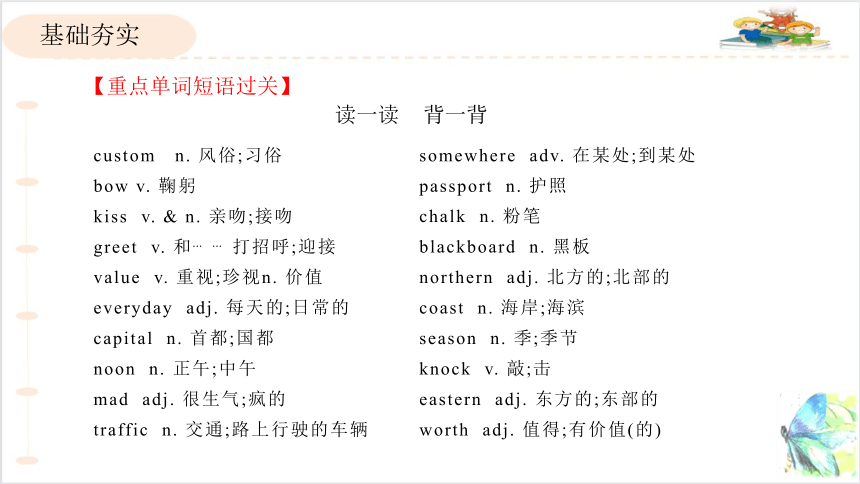
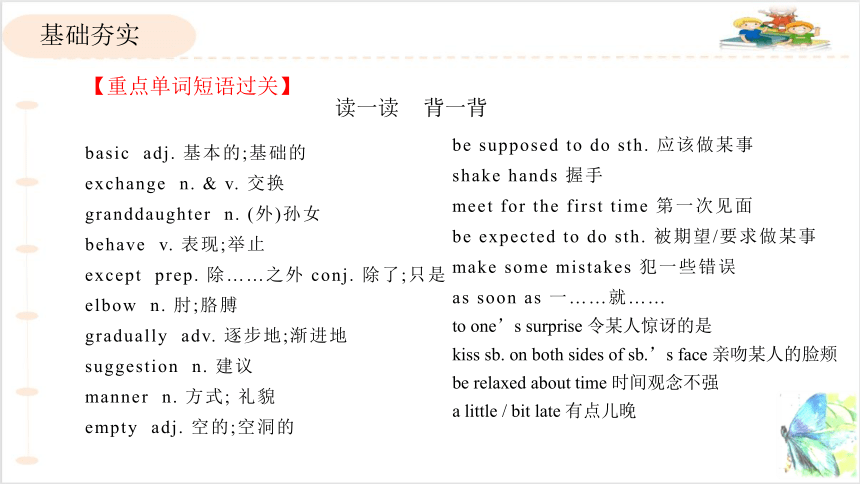
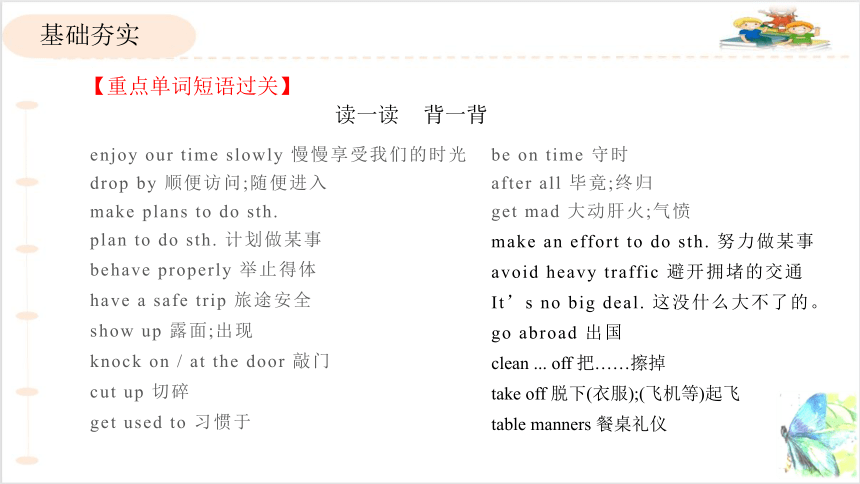
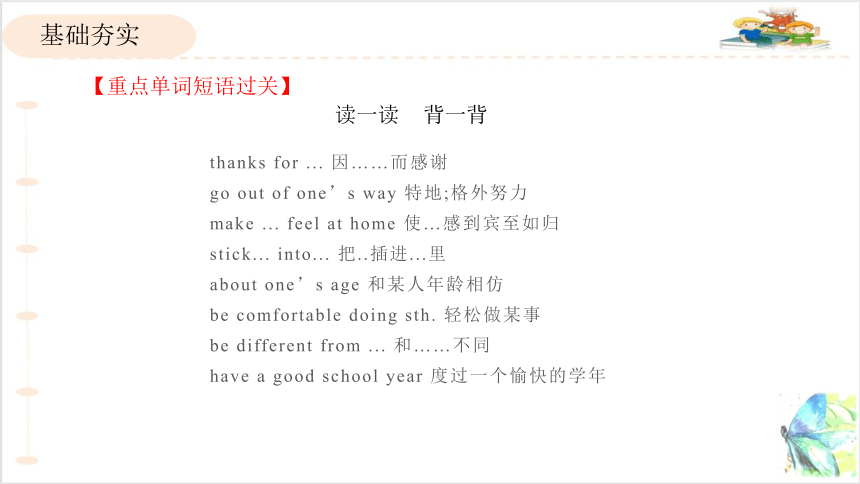
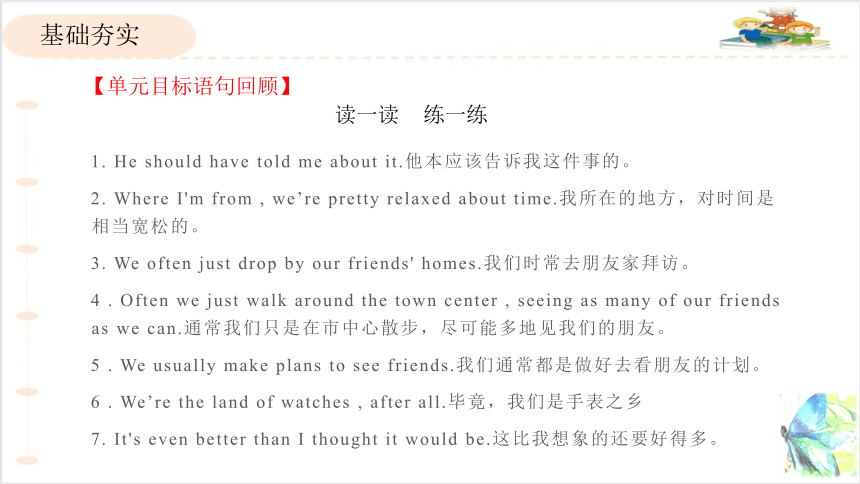
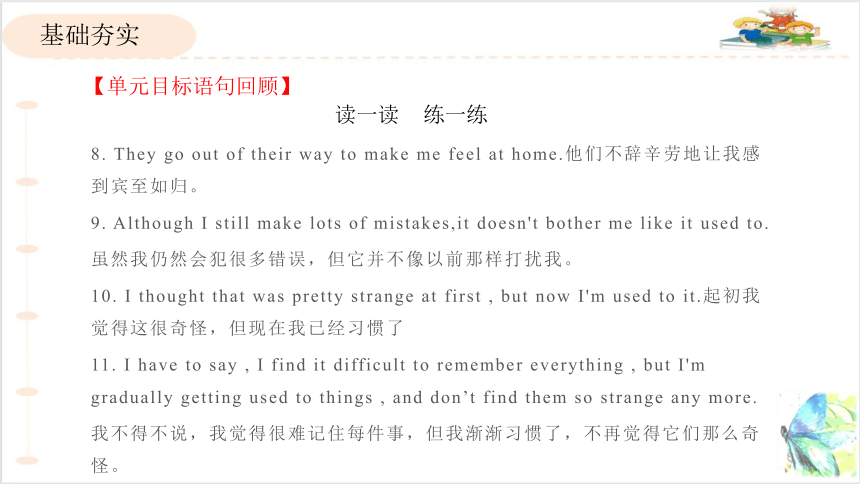
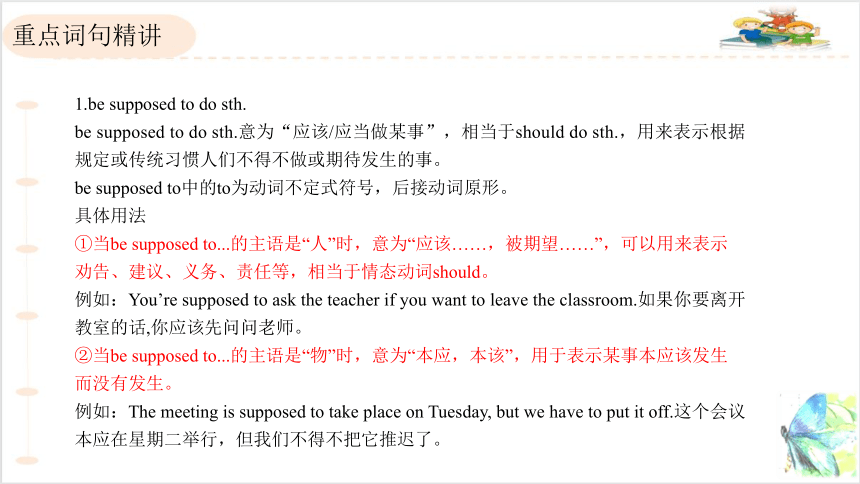
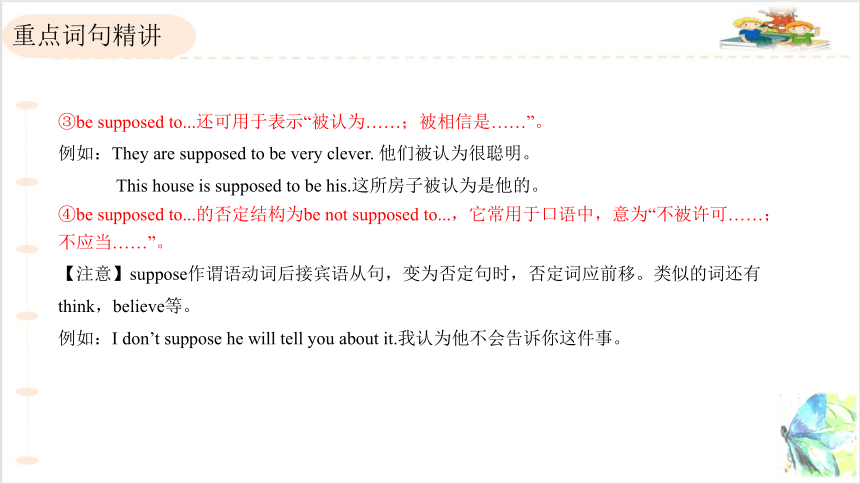
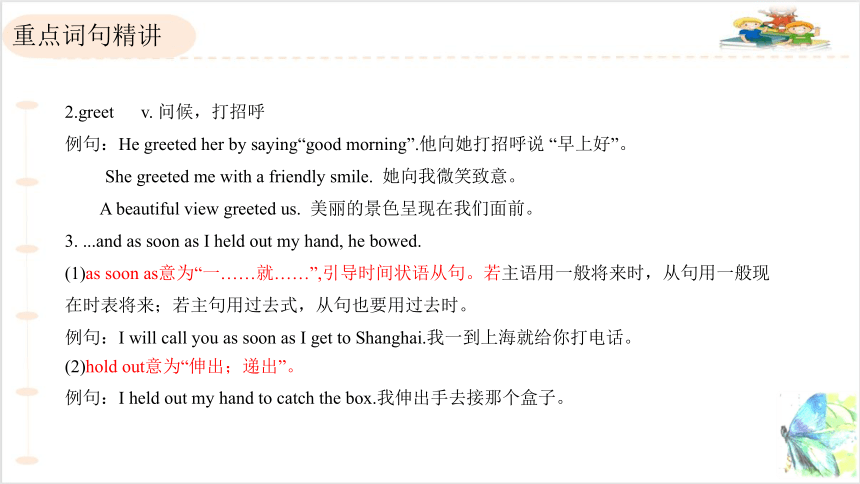
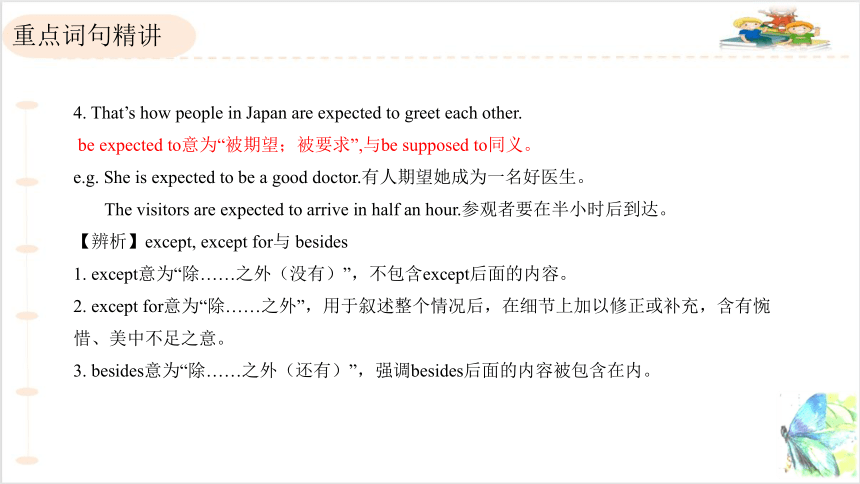
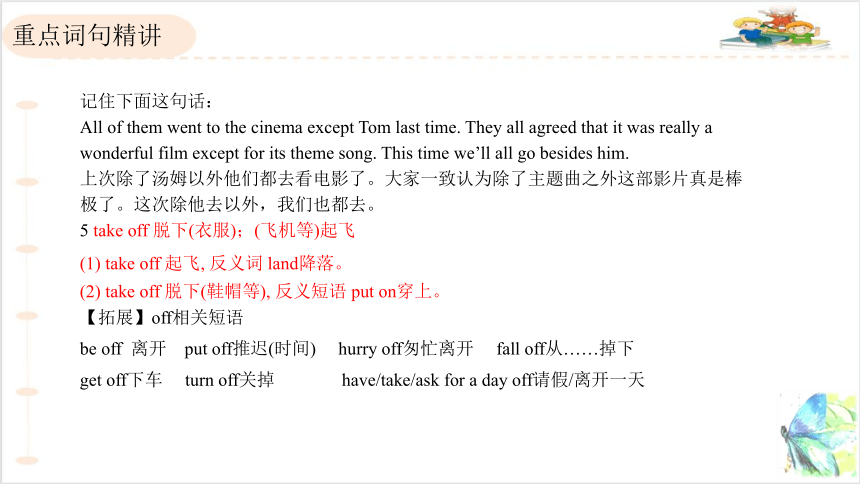
文档简介
(共30张PPT)
人教版英语九年级单元重点知识复习课件
Unit10 You're supposed to shake hands.
.
custom n. 风俗;习俗
bow v. 鞠躬
kiss v. & n. 亲吻;接吻
greet v. 和 打招呼;迎接
value v. 重视;珍视n. 价值
everyday adj. 每天的;日常的
capital n. 首都;国都
noon n. 正午;中午
mad adj. 很生气;疯的
traffic n. 交通;路上行驶的车辆
基础夯实
somewhere adv. 在某处;到某处
passport n. 护照
chalk n. 粉笔
blackboard n. 黑板
northern adj. 北方的;北部的
coast n. 海岸;海滨
season n. 季;季节
knock v. 敲;击
eastern adj. 东方的;东部的
worth adj. 值得;有价值(的)
【重点单词短语过关】
读一读 背一背
basic adj. 基本的;基础的
exchange n. & v. 交换
granddaughter n. (外)孙女
behave v. 表现;举止
except prep. 除……之外 conj. 除了;只是
elbow n. 肘;胳膊
gradually adv. 逐步地;渐进地
suggestion n. 建议
manner n. 方式; 礼貌
empty adj. 空的;空洞的
be supposed to do sth. 应该做某事
shake hands 握手
meet for the first time 第一次见面
be expected to do sth. 被期望/要求做某事
make some mistakes 犯一些错误
as soon as 一……就……
to one’s surprise 令某人惊讶的是
kiss sb. on both sides of sb.’s face 亲吻某人的脸颊
be relaxed about time 时间观念不强
a little / bit late 有点儿晚
【重点单词短语过关】
读一读 背一背
基础夯实
enjoy our time slowly 慢慢享受我们的时光
drop by 顺便访问;随便进入
make plans to do sth.
plan to do sth. 计划做某事
behave properly 举止得体
have a safe trip 旅途安全
show up 露面;出现
knock on / at the door 敲门
cut up 切碎
get used to 习惯于
【重点单词短语过关】
读一读 背一背
基础夯实
be on time 守时
after all 毕竟;终归
get mad 大动肝火;气愤
make an effort to do sth. 努力做某事
avoid heavy traffic 避开拥堵的交通
It’s no big deal. 这没什么大不了的。
go abroad 出国
clean ... off 把……擦掉
take off 脱下(衣服);(飞机等)起飞
table manners 餐桌礼仪
thanks for ... 因……而感谢
go out of one’s way 特地;格外努力
make ... feel at home 使…感到宾至如归
stick... into... 把..插进...里
about one’s age 和某人年龄相仿
be comfortable doing sth. 轻松做某事
be different from ... 和……不同
have a good school year 度过一个愉快的学年
【重点单词短语过关】
读一读 背一背
基础夯实
1. He should have told me about it.他本应该告诉我这件事的。
2. Where I'm from , we’re pretty relaxed about time.我所在的地方,对时间是相当宽松的。
3. We often just drop by our friends' homes.我们时常去朋友家拜访。
4 . Often we just walk around the town center , seeing as many of our friends as we can.通常我们只是在市中心散步,尽可能多地见我们的朋友。
5 . We usually make plans to see friends.我们通常都是做好去看朋友的计划。
6 . We’re the land of watches , after all.毕竟,我们是手表之乡
7. It's even better than I thought it would be.这比我想象的还要好得多。
【单元目标语句回顾】
读一读 练一练
基础夯实
8. They go out of their way to make me feel at home.他们不辞辛劳地让我感到宾至如归。
9. Although I still make lots of mistakes,it doesn't bother me like it used to.
虽然我仍然会犯很多错误,但它并不像以前那样打扰我。
10. I thought that was pretty strange at first , but now I'm used to it.起初我觉得这很奇怪,但现在我已经习惯了
11. I have to say , I find it difficult to remember everything , but I'm gradually getting used to things , and don’t find them so strange any more.
我不得不说,我觉得很难记住每件事,但我渐渐习惯了,不再觉得它们那么奇怪。
【单元目标语句回顾】
读一读 练一练
基础夯实
重点词句精讲
1.be supposed to do sth.
be supposed to do sth.意为“应该/应当做某事”,相当于should do sth.,用来表示根据规定或传统习惯人们不得不做或期待发生的事。
be supposed to中的to为动词不定式符号,后接动词原形。
具体用法
①当be supposed to...的主语是“人”时,意为“应该……,被期望……”,可以用来表示劝告、建议、义务、责任等,相当于情态动词should。
例如:You’re supposed to ask the teacher if you want to leave the classroom.如果你要离开教室的话,你应该先问问老师。
②当be supposed to...的主语是“物”时,意为“本应,本该”,用于表示某事本应该发生而没有发生。
例如:The meeting is supposed to take place on Tuesday, but we have to put it off.这个会议本应在星期二举行,但我们不得不把它推迟了。
重点词句精讲
③be supposed to...还可用于表示“被认为……;被相信是……”。
例如:They are supposed to be very clever. 他们被认为很聪明。
This house is supposed to be his.这所房子被认为是他的。
④be supposed to...的否定结构为be not supposed to...,它常用于口语中,意为“不被许可……;
不应当……”。
【注意】suppose作谓语动词后接宾语从句,变为否定句时,否定词应前移。类似的词还有think,believe等。
例如:I don’t suppose he will tell you about it.我认为他不会告诉你这件事。
重点词句精讲
2.greet v. 问候,打招呼
例句:He greeted her by saying“good morning”.他向她打招呼说 “早上好”。
She greeted me with a friendly smile. 她向我微笑致意。
A beautiful view greeted us. 美丽的景色呈现在我们面前。
3. ...and as soon as I held out my hand, he bowed.
(1)as soon as意为“一……就……”,引导时间状语从句。若主语用一般将来时,从句用一般现在时表将来;若主句用过去式,从句也要用过去时。
例句:I will call you as soon as I get to Shanghai.我一到上海就给你打电话。
(2)hold out意为“伸出;递出”。
例句:I held out my hand to catch the box.我伸出手去接那个盒子。
重点词句精讲
4. That’s how people in Japan are expected to greet each other.
be expected to意为“被期望;被要求”,与be supposed to同义。
e.g. She is expected to be a good doctor.有人期望她成为一名好医生。
The visitors are expected to arrive in half an hour.参观者要在半小时后到达。
【辨析】except, except for与 besides
1. except意为“除……之外(没有)”,不包含except后面的内容。
2. except for意为“除……之外”,用于叙述整个情况后,在细节上加以修正或补充,含有惋惜、美中不足之意。
3. besides意为“除……之外(还有)”,强调besides后面的内容被包含在内。
重点词句精讲
记住下面这句话:
All of them went to the cinema except Tom last time. They all agreed that it was really a wonderful film except for its theme song. This time we’ll all go besides him.
上次除了汤姆以外他们都去看电影了。大家一致认为除了主题曲之外这部影片真是棒极了。这次除他去以外,我们也都去。
5 take off 脱下(衣服);(飞机等)起飞
(1) take off 起飞, 反义词 land降落。
(2) take off 脱下(鞋帽等), 反义短语 put on穿上。
【拓展】off相关短语
be off 离开 put off推迟(时间) hurry off匆忙离开 fall off从……掉下
get off下车 turn off关掉 have/take/ask for a day off请假/离开一天
重点词句精讲
6.They go out of their way to make me feel at home.
go out of one’s way 特地;格外努力
e.g. John went out of his way to make his girlfriend happy.
约翰想方设法使他的女朋友高 兴。
7.make sb. feel at home 使某人感到宾至如归
e.g. I’m doing everything I can to make them feel at home.
我在尽我一切所能使他们感到宾至如归。
重点词句精讲
8.You wouldn’t believe how quickly my French has improved because of that.
You wouldn’t believe …是一个常用句式,相当于汉语所说的“你无法想象……;你想都想不到……;你绝不会相信……”,表示所陈述的事情超出想象之外。
与此类似的表达还有You would never believe…或You would hardly believe…。
例如:
You wouldn’t believe that he found his long-lost sister in Taiwan!
你绝对想不到他在台湾找到了失散多年的姐姐!
You would never believe what quick progress he’s made ever
since he attended your class.
你根本无法想象,自从他听了您的讲课后进步有多大。
重点词句精讲
9. My biggest challenge is learning how to behave at the dinner table.
(1) learning how to behave at the table是现在分词短语,在此用作句子的表语。
再如:His main hobby is fishing. 他的主要爱好是钓鱼。
(2)behave是不及物动词,意为“表现;行为”,behave well / badly表示“表现好/糟糕”。它的名词形式 behaviour (举止;行为),是不可数名词。
10.I have to say that I find it difficult to remember everything, but I’m gradually getting used to it. I don’t find French customs so strange anymore.我不得不说,我觉得记住所有的规矩是很难的,但是我也渐渐习惯了这些,不再觉得它们奇怪了。
(1)在 I find it difficult to remember... 句中,it是形式宾 语,真正的宾语是后面的动词不定式短语 to remember everything。其句型结构为:find+ it + adj. + to do sth. 类似用法的动词还有:think, believe, know, feel等。
重点词句精讲
(2)be/get used to 意为“习惯于……”,后接名词、代词或动名词。
【辨析】
used to 表示“过去经常”,后接动词原形。
be/get used to 表示“习惯于”,后接名词、代词或动词-ing形式。
be used to do/be used for doing 表示“用于;被用来做”, 是动词use的被动结构。
重点词句精讲
11.Where I’m from, we are pretty relaxed about time.在我那儿,我们对时间(的要求)相当宽松。
Where I’m from是一个由where引导的地点状语从句。
e.g. Just stay where you are.就留在你原来的地方。
be relaxed about/at 意为“对…随意;对……宽松”, 后可接名词、代词或动词-ing形式。
e.g. In fact, they are relaxed about the match.
事实上, 他们对这次比赛感到很放松。
It’s necessary to learn how to relax.
学会怎样放松是必要的。
We had a very relaxing time during the vacation.
假期我们过得很放松。
重点词句精讲
【归纳拓展】 你会正确“放松”吗
We can relax ourselves and feel really relaxed by taking a relaxing trip.
通过轻松的旅行, 我们可以放松自己并使自己感到真正的放松。
Their parents are relaxed about what they do at home.
他们的父母对他们在家做的事情很宽松。
词汇 词性 用 法
relax 动词 意为“放松;休息”,其现在分词形式是relaxing,过去式、过去分词形式是relaxed
relaxed 形容词 意为“放松的;宽松的;轻松自在的”, 用来修饰、说明人的情感状态
relaxing 形容词 意为“令人放松的”, 用来修饰、说明事物的特征
重点词句精讲
12.So I make an effort to be on time when I meet my friends.
make an effort 做出努力
例如:You should make an effort to improve your reading ability.你应该努力提高你的阅读能力。
13.Also, we never visit a friend’s house without calling first. 而且, 我们不会事先不打电话就去朋友家的。
双重否定句,never和without 都表示否定,合在一起表达肯定意义。
例如:You will hardly ever be able to speak good English without practicing.不练习的话,你几乎不可能把英语说好的。
重点词句精讲
14. We value the time we spend with our family and friends in our everyday lives.
value 意为“重视;珍视”。 value还可以作名词,意为“价值”。
例句:Which do you value, wealth or health 你珍视哪一个,财富还是健康?
15.We often just drop by our friends’ homes if we have time.
drop by意为“顺便拜访;随便进入”
He dropped by his friend's house when he cameback from work.他下班回来,顺便到朋友家坐了坐。
【辨析】drop by 和drop in
drop by 后接某人/某地,表示“拜访某人或某地”
drop in 后接on+某人,表示“拜访某人”
后接at+某地,表示“访问某地”
重点词句精讲
16.We often just walk around the town center, seeing as many of our friends as we can!
(1)seeing为现在分词短语作状语,表示主语正在进行的另一动作。
(2)as many/much as...can意为“尽可能多地”,相当于as many/much as possible。例如:
You must try to remember as many new words as you can.
你应该记住尽可能多的单词。
17.We’re the capital of clocks and watches, after all!
after all 意为“毕竟;终究;终归;到底”,可以位于句首,句中和句末。
After all, your birthday is only two weeks away.
毕竟,两周后就是你的生日了。
He is, after all, a child. 他毕竟还是个孩子。
语法知识精讲
be supposed to的用法
仔细观察例句,体会句式结构。
1. 含义及构成。
be supposed to意为“应该;被期望;理应”,用来表示根据规定人们不得不做某事或期待发生某事,时态、人称和句式的变化体现在be的变化上,to为动词不定式符号,后接动词原形。
be supposed to相当于should。
e.g. You are supposed to arrive at the meeting at 8: 00. =You should arrive at the meeting at 8: 00. 你应该八点到会。
You are supposed to shake hands.
语法知识精讲
2. 否定结构。
be supposed to的否定式,要在be后加not,此时相当于be not allowed to do,意为“不被许可;不应”。
例句:You are not supposed to eat with your hands.
3. 疑问结构。
be supposed to的疑问句式要将be的相应形式提到主语前。
例句:When were you supposed to arrive at the party
语法知识精讲
expect是及物动词,意为“预料,盼望”,它有以下常见用法:
expect+n. /pron. 预计……可能发生;期待某人或某物
The old man is expecting his daughter’s visit.
这个老人正盼望着他女儿的到访。
(2) expect+to do sth. 料想做某事
In the United States, they’re expected to shake hands.
在美国,人们希望他们握手。
(3) expect sb. to do sth. 期望某人做某事
Do you expect him to teach you English
你希望他教你英语吗
(4) expect +从句 预计/料想……
实战演练
一、单项选择题
1. Thank you for ____ me the customs in your country.
A. tell B. told C. telling D. tells
2. I wouldn’t like to go shopping at this time of day.
It’s always ______ .
A. crowd B. crowding
C. uncrowded D. crowded
3. —How was your trip to Taiwan
—Great! It’s even ______ than I thought it would be.
A. good B. well C. better D. best
4. They all passed the exam ______ Jack. He was really sad.
A. except B. beside C. besides D. except for
C
A
C
D
实战演练
一、单项选择题
5. I like gentle music that can make us ______ relaxed.
A. feels B. felt C. feel D. feeling
6. There are many trees on ______ side of the road.
A. both B. each C. every D. none
7.Jane _______ to call me last night, but she didn’t.
A. supposed B. supposes
C. was supposed D. is suppose
8.Told him the good news ________ he came back yesterday.
A. until B. as soon as
C. unless D. since
B
C
C
B
实战演练
二、用所给单词的适当形式填空。
You can imagine how different the table manners here are from _______. (we)
People in Japan and people in America behave _________ (different) at the dinner table.
The host family did their best to make me ________ (feel) at home.
In China, one is supposed to ______ (spend) time with his family during Spring Festival.
You’re not supposed to eat or drink while ________ (walk) down the street.
It’s not polite ________ (make) noise while eating noodles.
It’s not polite to call others’ without _______ (call) first.
ours
differently
feel
spend
walking
to make
calling
实战演练
三、根据汉语意思完成句子,每空一词。
1.把筷子插入食物中是粗鲁的。
___ _____ to _____ your _________ _____ the food.
2.你不应用筷子指人。
You _____ _________ ___ ______ ___ anyone _____ your chopsticks.
3.在巴西,你每次喝完饮料都要用餐巾把嘴巴擦干净。
In Brazil, you _______ wipe your mouth ____ your napkin every time you _____ ___ ______.
4.在日本,吃面条时发出声音是礼貌的。
In Japan ___ _______ to _____ __ _____ _____ _______ noodles.
5. He should arrive there at 7:00.(同义句)
He ___ ________ ___ ______ there at 7:00.
It’s rude stick chopsticks into
with
aren’t supposed to point at
take a
should with
drink
it’s polite make a noise while eating
is supposed to arrive
实战演练
四、根据句意及首字母提示填空。
1. Beijing is the c of China.
2. Everyone should v what we have owned.
3. Waiting for a long time makes me m .
4. It’s n now. Let’s stop working to have lunch.
5. Listening to soft music can make me feel r .
apital
alue
ad
oon
elaxed
实战演练
That's all.Thank you!
人教版英语九年级单元重点知识复习课件
Unit10 You're supposed to shake hands.
.
custom n. 风俗;习俗
bow v. 鞠躬
kiss v. & n. 亲吻;接吻
greet v. 和 打招呼;迎接
value v. 重视;珍视n. 价值
everyday adj. 每天的;日常的
capital n. 首都;国都
noon n. 正午;中午
mad adj. 很生气;疯的
traffic n. 交通;路上行驶的车辆
基础夯实
somewhere adv. 在某处;到某处
passport n. 护照
chalk n. 粉笔
blackboard n. 黑板
northern adj. 北方的;北部的
coast n. 海岸;海滨
season n. 季;季节
knock v. 敲;击
eastern adj. 东方的;东部的
worth adj. 值得;有价值(的)
【重点单词短语过关】
读一读 背一背
basic adj. 基本的;基础的
exchange n. & v. 交换
granddaughter n. (外)孙女
behave v. 表现;举止
except prep. 除……之外 conj. 除了;只是
elbow n. 肘;胳膊
gradually adv. 逐步地;渐进地
suggestion n. 建议
manner n. 方式; 礼貌
empty adj. 空的;空洞的
be supposed to do sth. 应该做某事
shake hands 握手
meet for the first time 第一次见面
be expected to do sth. 被期望/要求做某事
make some mistakes 犯一些错误
as soon as 一……就……
to one’s surprise 令某人惊讶的是
kiss sb. on both sides of sb.’s face 亲吻某人的脸颊
be relaxed about time 时间观念不强
a little / bit late 有点儿晚
【重点单词短语过关】
读一读 背一背
基础夯实
enjoy our time slowly 慢慢享受我们的时光
drop by 顺便访问;随便进入
make plans to do sth.
plan to do sth. 计划做某事
behave properly 举止得体
have a safe trip 旅途安全
show up 露面;出现
knock on / at the door 敲门
cut up 切碎
get used to 习惯于
【重点单词短语过关】
读一读 背一背
基础夯实
be on time 守时
after all 毕竟;终归
get mad 大动肝火;气愤
make an effort to do sth. 努力做某事
avoid heavy traffic 避开拥堵的交通
It’s no big deal. 这没什么大不了的。
go abroad 出国
clean ... off 把……擦掉
take off 脱下(衣服);(飞机等)起飞
table manners 餐桌礼仪
thanks for ... 因……而感谢
go out of one’s way 特地;格外努力
make ... feel at home 使…感到宾至如归
stick... into... 把..插进...里
about one’s age 和某人年龄相仿
be comfortable doing sth. 轻松做某事
be different from ... 和……不同
have a good school year 度过一个愉快的学年
【重点单词短语过关】
读一读 背一背
基础夯实
1. He should have told me about it.他本应该告诉我这件事的。
2. Where I'm from , we’re pretty relaxed about time.我所在的地方,对时间是相当宽松的。
3. We often just drop by our friends' homes.我们时常去朋友家拜访。
4 . Often we just walk around the town center , seeing as many of our friends as we can.通常我们只是在市中心散步,尽可能多地见我们的朋友。
5 . We usually make plans to see friends.我们通常都是做好去看朋友的计划。
6 . We’re the land of watches , after all.毕竟,我们是手表之乡
7. It's even better than I thought it would be.这比我想象的还要好得多。
【单元目标语句回顾】
读一读 练一练
基础夯实
8. They go out of their way to make me feel at home.他们不辞辛劳地让我感到宾至如归。
9. Although I still make lots of mistakes,it doesn't bother me like it used to.
虽然我仍然会犯很多错误,但它并不像以前那样打扰我。
10. I thought that was pretty strange at first , but now I'm used to it.起初我觉得这很奇怪,但现在我已经习惯了
11. I have to say , I find it difficult to remember everything , but I'm gradually getting used to things , and don’t find them so strange any more.
我不得不说,我觉得很难记住每件事,但我渐渐习惯了,不再觉得它们那么奇怪。
【单元目标语句回顾】
读一读 练一练
基础夯实
重点词句精讲
1.be supposed to do sth.
be supposed to do sth.意为“应该/应当做某事”,相当于should do sth.,用来表示根据规定或传统习惯人们不得不做或期待发生的事。
be supposed to中的to为动词不定式符号,后接动词原形。
具体用法
①当be supposed to...的主语是“人”时,意为“应该……,被期望……”,可以用来表示劝告、建议、义务、责任等,相当于情态动词should。
例如:You’re supposed to ask the teacher if you want to leave the classroom.如果你要离开教室的话,你应该先问问老师。
②当be supposed to...的主语是“物”时,意为“本应,本该”,用于表示某事本应该发生而没有发生。
例如:The meeting is supposed to take place on Tuesday, but we have to put it off.这个会议本应在星期二举行,但我们不得不把它推迟了。
重点词句精讲
③be supposed to...还可用于表示“被认为……;被相信是……”。
例如:They are supposed to be very clever. 他们被认为很聪明。
This house is supposed to be his.这所房子被认为是他的。
④be supposed to...的否定结构为be not supposed to...,它常用于口语中,意为“不被许可……;
不应当……”。
【注意】suppose作谓语动词后接宾语从句,变为否定句时,否定词应前移。类似的词还有think,believe等。
例如:I don’t suppose he will tell you about it.我认为他不会告诉你这件事。
重点词句精讲
2.greet v. 问候,打招呼
例句:He greeted her by saying“good morning”.他向她打招呼说 “早上好”。
She greeted me with a friendly smile. 她向我微笑致意。
A beautiful view greeted us. 美丽的景色呈现在我们面前。
3. ...and as soon as I held out my hand, he bowed.
(1)as soon as意为“一……就……”,引导时间状语从句。若主语用一般将来时,从句用一般现在时表将来;若主句用过去式,从句也要用过去时。
例句:I will call you as soon as I get to Shanghai.我一到上海就给你打电话。
(2)hold out意为“伸出;递出”。
例句:I held out my hand to catch the box.我伸出手去接那个盒子。
重点词句精讲
4. That’s how people in Japan are expected to greet each other.
be expected to意为“被期望;被要求”,与be supposed to同义。
e.g. She is expected to be a good doctor.有人期望她成为一名好医生。
The visitors are expected to arrive in half an hour.参观者要在半小时后到达。
【辨析】except, except for与 besides
1. except意为“除……之外(没有)”,不包含except后面的内容。
2. except for意为“除……之外”,用于叙述整个情况后,在细节上加以修正或补充,含有惋惜、美中不足之意。
3. besides意为“除……之外(还有)”,强调besides后面的内容被包含在内。
重点词句精讲
记住下面这句话:
All of them went to the cinema except Tom last time. They all agreed that it was really a wonderful film except for its theme song. This time we’ll all go besides him.
上次除了汤姆以外他们都去看电影了。大家一致认为除了主题曲之外这部影片真是棒极了。这次除他去以外,我们也都去。
5 take off 脱下(衣服);(飞机等)起飞
(1) take off 起飞, 反义词 land降落。
(2) take off 脱下(鞋帽等), 反义短语 put on穿上。
【拓展】off相关短语
be off 离开 put off推迟(时间) hurry off匆忙离开 fall off从……掉下
get off下车 turn off关掉 have/take/ask for a day off请假/离开一天
重点词句精讲
6.They go out of their way to make me feel at home.
go out of one’s way 特地;格外努力
e.g. John went out of his way to make his girlfriend happy.
约翰想方设法使他的女朋友高 兴。
7.make sb. feel at home 使某人感到宾至如归
e.g. I’m doing everything I can to make them feel at home.
我在尽我一切所能使他们感到宾至如归。
重点词句精讲
8.You wouldn’t believe how quickly my French has improved because of that.
You wouldn’t believe …是一个常用句式,相当于汉语所说的“你无法想象……;你想都想不到……;你绝不会相信……”,表示所陈述的事情超出想象之外。
与此类似的表达还有You would never believe…或You would hardly believe…。
例如:
You wouldn’t believe that he found his long-lost sister in Taiwan!
你绝对想不到他在台湾找到了失散多年的姐姐!
You would never believe what quick progress he’s made ever
since he attended your class.
你根本无法想象,自从他听了您的讲课后进步有多大。
重点词句精讲
9. My biggest challenge is learning how to behave at the dinner table.
(1) learning how to behave at the table是现在分词短语,在此用作句子的表语。
再如:His main hobby is fishing. 他的主要爱好是钓鱼。
(2)behave是不及物动词,意为“表现;行为”,behave well / badly表示“表现好/糟糕”。它的名词形式 behaviour (举止;行为),是不可数名词。
10.I have to say that I find it difficult to remember everything, but I’m gradually getting used to it. I don’t find French customs so strange anymore.我不得不说,我觉得记住所有的规矩是很难的,但是我也渐渐习惯了这些,不再觉得它们奇怪了。
(1)在 I find it difficult to remember... 句中,it是形式宾 语,真正的宾语是后面的动词不定式短语 to remember everything。其句型结构为:find+ it + adj. + to do sth. 类似用法的动词还有:think, believe, know, feel等。
重点词句精讲
(2)be/get used to 意为“习惯于……”,后接名词、代词或动名词。
【辨析】
used to 表示“过去经常”,后接动词原形。
be/get used to 表示“习惯于”,后接名词、代词或动词-ing形式。
be used to do/be used for doing 表示“用于;被用来做”, 是动词use的被动结构。
重点词句精讲
11.Where I’m from, we are pretty relaxed about time.在我那儿,我们对时间(的要求)相当宽松。
Where I’m from是一个由where引导的地点状语从句。
e.g. Just stay where you are.就留在你原来的地方。
be relaxed about/at 意为“对…随意;对……宽松”, 后可接名词、代词或动词-ing形式。
e.g. In fact, they are relaxed about the match.
事实上, 他们对这次比赛感到很放松。
It’s necessary to learn how to relax.
学会怎样放松是必要的。
We had a very relaxing time during the vacation.
假期我们过得很放松。
重点词句精讲
【归纳拓展】 你会正确“放松”吗
We can relax ourselves and feel really relaxed by taking a relaxing trip.
通过轻松的旅行, 我们可以放松自己并使自己感到真正的放松。
Their parents are relaxed about what they do at home.
他们的父母对他们在家做的事情很宽松。
词汇 词性 用 法
relax 动词 意为“放松;休息”,其现在分词形式是relaxing,过去式、过去分词形式是relaxed
relaxed 形容词 意为“放松的;宽松的;轻松自在的”, 用来修饰、说明人的情感状态
relaxing 形容词 意为“令人放松的”, 用来修饰、说明事物的特征
重点词句精讲
12.So I make an effort to be on time when I meet my friends.
make an effort 做出努力
例如:You should make an effort to improve your reading ability.你应该努力提高你的阅读能力。
13.Also, we never visit a friend’s house without calling first. 而且, 我们不会事先不打电话就去朋友家的。
双重否定句,never和without 都表示否定,合在一起表达肯定意义。
例如:You will hardly ever be able to speak good English without practicing.不练习的话,你几乎不可能把英语说好的。
重点词句精讲
14. We value the time we spend with our family and friends in our everyday lives.
value 意为“重视;珍视”。 value还可以作名词,意为“价值”。
例句:Which do you value, wealth or health 你珍视哪一个,财富还是健康?
15.We often just drop by our friends’ homes if we have time.
drop by意为“顺便拜访;随便进入”
He dropped by his friend's house when he cameback from work.他下班回来,顺便到朋友家坐了坐。
【辨析】drop by 和drop in
drop by 后接某人/某地,表示“拜访某人或某地”
drop in 后接on+某人,表示“拜访某人”
后接at+某地,表示“访问某地”
重点词句精讲
16.We often just walk around the town center, seeing as many of our friends as we can!
(1)seeing为现在分词短语作状语,表示主语正在进行的另一动作。
(2)as many/much as...can意为“尽可能多地”,相当于as many/much as possible。例如:
You must try to remember as many new words as you can.
你应该记住尽可能多的单词。
17.We’re the capital of clocks and watches, after all!
after all 意为“毕竟;终究;终归;到底”,可以位于句首,句中和句末。
After all, your birthday is only two weeks away.
毕竟,两周后就是你的生日了。
He is, after all, a child. 他毕竟还是个孩子。
语法知识精讲
be supposed to的用法
仔细观察例句,体会句式结构。
1. 含义及构成。
be supposed to意为“应该;被期望;理应”,用来表示根据规定人们不得不做某事或期待发生某事,时态、人称和句式的变化体现在be的变化上,to为动词不定式符号,后接动词原形。
be supposed to相当于should。
e.g. You are supposed to arrive at the meeting at 8: 00. =You should arrive at the meeting at 8: 00. 你应该八点到会。
You are supposed to shake hands.
语法知识精讲
2. 否定结构。
be supposed to的否定式,要在be后加not,此时相当于be not allowed to do,意为“不被许可;不应”。
例句:You are not supposed to eat with your hands.
3. 疑问结构。
be supposed to的疑问句式要将be的相应形式提到主语前。
例句:When were you supposed to arrive at the party
语法知识精讲
expect是及物动词,意为“预料,盼望”,它有以下常见用法:
expect+n. /pron. 预计……可能发生;期待某人或某物
The old man is expecting his daughter’s visit.
这个老人正盼望着他女儿的到访。
(2) expect+to do sth. 料想做某事
In the United States, they’re expected to shake hands.
在美国,人们希望他们握手。
(3) expect sb. to do sth. 期望某人做某事
Do you expect him to teach you English
你希望他教你英语吗
(4) expect +从句 预计/料想……
实战演练
一、单项选择题
1. Thank you for ____ me the customs in your country.
A. tell B. told C. telling D. tells
2. I wouldn’t like to go shopping at this time of day.
It’s always ______ .
A. crowd B. crowding
C. uncrowded D. crowded
3. —How was your trip to Taiwan
—Great! It’s even ______ than I thought it would be.
A. good B. well C. better D. best
4. They all passed the exam ______ Jack. He was really sad.
A. except B. beside C. besides D. except for
C
A
C
D
实战演练
一、单项选择题
5. I like gentle music that can make us ______ relaxed.
A. feels B. felt C. feel D. feeling
6. There are many trees on ______ side of the road.
A. both B. each C. every D. none
7.Jane _______ to call me last night, but she didn’t.
A. supposed B. supposes
C. was supposed D. is suppose
8.Told him the good news ________ he came back yesterday.
A. until B. as soon as
C. unless D. since
B
C
C
B
实战演练
二、用所给单词的适当形式填空。
You can imagine how different the table manners here are from _______. (we)
People in Japan and people in America behave _________ (different) at the dinner table.
The host family did their best to make me ________ (feel) at home.
In China, one is supposed to ______ (spend) time with his family during Spring Festival.
You’re not supposed to eat or drink while ________ (walk) down the street.
It’s not polite ________ (make) noise while eating noodles.
It’s not polite to call others’ without _______ (call) first.
ours
differently
feel
spend
walking
to make
calling
实战演练
三、根据汉语意思完成句子,每空一词。
1.把筷子插入食物中是粗鲁的。
___ _____ to _____ your _________ _____ the food.
2.你不应用筷子指人。
You _____ _________ ___ ______ ___ anyone _____ your chopsticks.
3.在巴西,你每次喝完饮料都要用餐巾把嘴巴擦干净。
In Brazil, you _______ wipe your mouth ____ your napkin every time you _____ ___ ______.
4.在日本,吃面条时发出声音是礼貌的。
In Japan ___ _______ to _____ __ _____ _____ _______ noodles.
5. He should arrive there at 7:00.(同义句)
He ___ ________ ___ ______ there at 7:00.
It’s rude stick chopsticks into
with
aren’t supposed to point at
take a
should with
drink
it’s polite make a noise while eating
is supposed to arrive
实战演练
四、根据句意及首字母提示填空。
1. Beijing is the c of China.
2. Everyone should v what we have owned.
3. Waiting for a long time makes me m .
4. It’s n now. Let’s stop working to have lunch.
5. Listening to soft music can make me feel r .
apital
alue
ad
oon
elaxed
实战演练
That's all.Thank you!
同课章节目录
- Unit 1 How can we become good learners.
- Section A
- Section B
- Unit 2 I think that mooncakes are delicious!
- Section A
- Section B
- Unit 3 Could you please tell me where the restroom
- Section A
- Section B
- Unit 4 I used to be afraid of the dark.
- Section A
- Section B
- Unit 5 What are the shirts made of?
- Section A
- Section B
- Review of Units 1-5
- Unit 6 When was it invented?
- Section A
- Section B
- Unit 7 Teenagers should be allowed to choose their
- Section A
- Section B
- Unit 8 It must belong to Carla.
- Section A
- Section B
- Unit 9 I like music that I can dance to.
- Section A
- Section B
- Unit 10 You're supposed to shake hands.
- Section A
- Section B
- Review of Units 6-10
- Unit 11 Sad movies make me cry.
- Section A
- Section B
- Unit 12 Life is full of the unexpected
- Section A
- Section B
- Unit 13 We're trying to save the earth!
- Section A
- Section B
- Unit 14 I remember meeting all of you in Grade 7.
- Section A
- Section B
- Review of Units 11-14
